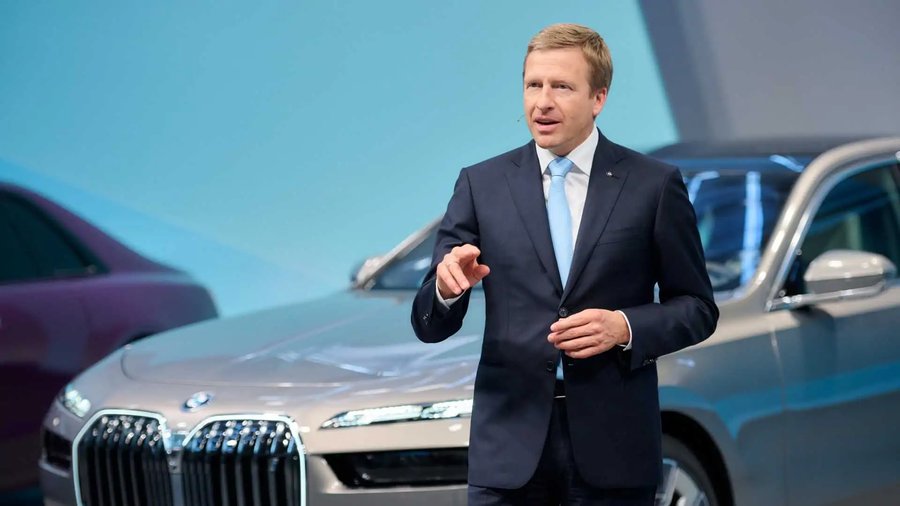BMW Chief Says EU Must Cancel 2035 Gas Engine Ban

BMW Group CEO Oliver Zipse said during this year’s Paris Motor Show that the European Union must cancel the upcoming 2035 ban on vehicles that emit carbon dioxide. In doing so, the German automaker’s chief added fuel to the fire that has been slowly burning in the EU ever since the Bloc approved its emission-cutting regulation last year.
The plan, which went into effect in April 2023, imposed a fleet-wide carbon dioxide emissions limit of 95 grams of CO2/kilometer for new cars sold in the EU this year, while vans must not exceed 147 g CO2/km–values extracted from the outdated NEDC testing procedure. From 2025 to 2030, new cars must slot below 93.5 g CO2/km while the limit for vans goes up to 153.9 g CO2/km–but on the newer and stricter WLTP testing. However, the limits will get stricter after 2030, and from 2035, all new cars and vans sold in the EU must be emissions-free.
"A correction of the 100% BEV target for 2035 as part of a comprehensive CO2-reduction package would also afford European OEMs less reliance on China for batteries," Zipse said at the Paris Motor Show, quoted by Reuters. "To maintain the successful course, a strictly technology-agnostic path within the policy framework is essential," he added.
In other words, BMW Group’s head honcho says the upcoming ban will only force Europe to rely even more on Chinese batteries for making electric vehicles–the vehicle category expected to almost completely replace combustion vehicles after 2035.
It’s worth noting that the EU regulation doesn’t ban gas or diesel vehicles outright, but rather forces automakers to come up with vehicles that don’t emit carbon dioxide into the atmosphere. Fuel-cell vehicles and even e-fuel-powered cars will be allowed, but the infrastructure for these is extremely limited, as opposed to the EV charging infrastructure that is growing at a rapid pace.
Zipse said the mood in Europe was “trending towards one of pessimism” and that the region needed a new regulatory framework to remain competitive. The ban “could also threaten the European automotive industry in its heart,” he added. The regulation will “with today’s assumptions, lead to a massive shrinking of the industry as a whole.”
Chinese automakers, which–in case you weren’t paying attention–are gobbling up more and more market share in Europe, are exclusively focused on all-electric and plug-in hybrid vehicles, often at very competitive prices. These cars sip less fuel–or none at all–and the long-term savings are significant compared to ICE vehicles.
Even with the recently approved import tariffs on Chinese-made electric vehicles, which will go into effect next year, automotive powerhouses like BYD are confident that if they play the long game, they can’t lose.
"We are now hearing that many companies are going back to combustion engine cars. But if the whole world switches to electric cars in five years, they will not be ready for it because they have not invested," said BYD President Stella Li said in an interview with a German newspaper. "In the long term, that is very dangerous. It will kill these car manufacturers."
Sales of all-electric and plug-in hybrid vehicles in Europe were down 4% in the first nine months of the year compared to 2023. All-electric cars, however, saw a steady 12% year-over-year increase in September, while PHEVs went down 12%, according to data from Rho Motion. Globally, BMW AG is doing well on the EV front, with 266,151 units sold in the first nine months, up 22.6% from last year.
But the bigger issues here are a slowing car market in general, with EU sales going down 18.3% in August, and the unpleasant prospect of paying billions of euros of fines if the emissions limits aren’t reached. This money could be otherwise invested in zero-emissions vehicles, according to the European Automobile Manufacturers’ Association (ACEA), which, coincidentally or not, includes BMW Group.
This isn’t the first time someone opposed the carbon-slashing regulation in the EU. Volkswagen and Renault, as well as the Italian government, proposed that the CO2 targets be loosened or delayed. That hasn’t happened, though, so the limits will be enforced as per the law.
Related News


